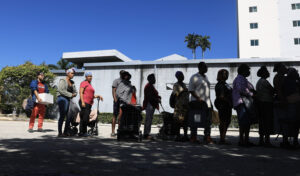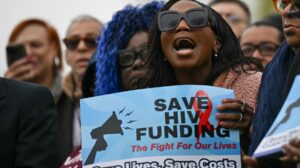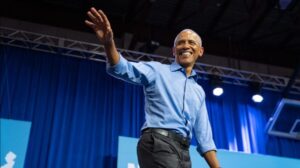The Dictatorship
Britain’s king stripping brother Andrew of his ‘prince’ title isn’t the end of the story
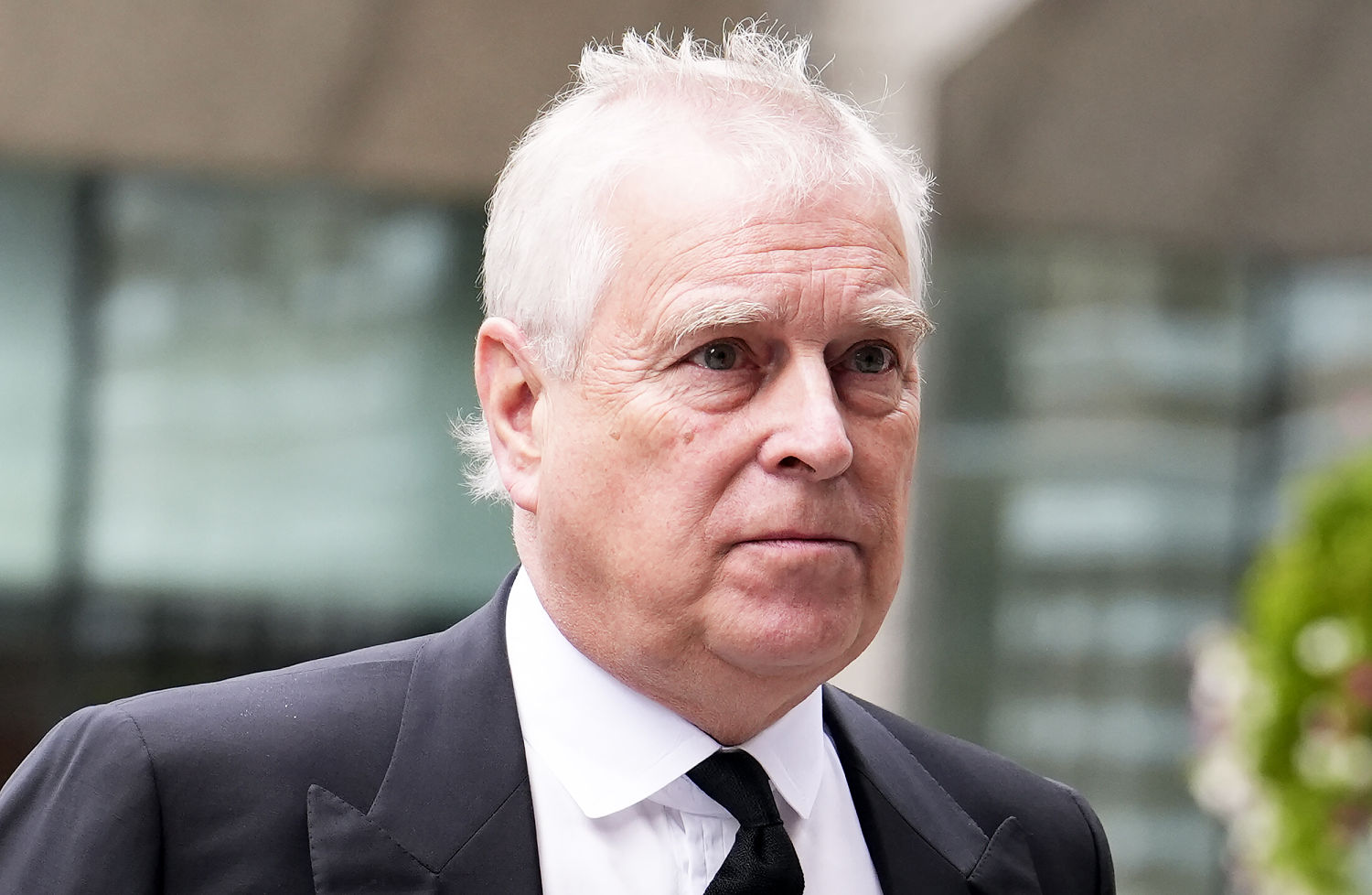
Buckingham Palace would like for us to see power and majesty in its announcement Thursday that King Charles III is stripping his younger brother Andrew of the title of “prince” and booting him from his 30-room residence. After all, no British prince has been officially de-titled in more than a century. None has been so publicly evicted.
But while removing all royal vestiges from Andrew is a momentous step, make no mistake: Charles was backed into a corner. If the monarchy is to survive this saga, the monarch had little choice but to distance the royal family from its most disgraced member — or at least appear to do so. Distinguishing Andrew from the rest of the royal family is Windsor brand management after years of taint by association.
Distinguishing Andrew from the rest of the royal family is Windsor brand management after years of taint by association.
Andrew has been in headlines over his friendship with a convicted sex offender; accusations of sexual assault (which he continues to deny); and links to figures in a government spy case. Allegations of questionable relationships and lavish trips shadowed his years as a British trade envoy. Charles may be used to heckling, but questions shouted at the king this week about what he knew about Andrew and Jeffrey Epstein were replayed over and over on U.K. media — reflecting a national disgust that had sparked talk in Parliament. The king acted partly to ensure lawmakers didn’t.
“These censures are deemed necessary, notwithstanding the fact that he continues to deny the allegations against him,” the palace statement said. “Their Majesties wish to make clear that their thoughts and utmost sympathies have been, and will remain with, the victims and survivors of any and all forms of abuse.”
This language suggests Charles supports women such as Virginia Roberts Giuffre, an American whose allegations that she was trafficked as a teenager by Epstein and forced to have sex with Andrew three times were first published in Britain in 2011. (Andrew has repeatedly denied the accusations. Giuffre settled a lawsuit with Epstein for $500,000 in 2009.)
Giuffre, who died by suicide in April, wrote a memoir that was published posthumously last week. Excerpts from the memoir — which is No. 1 on the Amazon sales chart — intensified media scrutiny on Andrew, who’d been in headlines since the summer publication of the biography “Entitled: The Rise and Fall of the House of York.” Pages were stuffed with anecdotes and mostly anonymous recollections of not just Andrew’s boorish behavior but also his penchant for private flights on the public’s dimeallegations of self-enriching business deals and details of his encounters with Epstein starting in 1999. The biography “hasn’t so much cemented Prince Andrew’s reputation, as put it in concrete boots and thrown it in the river,” the BBC’s royal correspondent wrote in August.
Further blows came from newly surfaced links to Epstein, with the most radioactive reports showing the prince in friendly conversation with Epstein months after he’d claimed to have cut off contact. Andrew’s denials of wrongdoing, previously trusted by royal aides, were compromised — as was the palace practice of letting Andrew manage fallout.
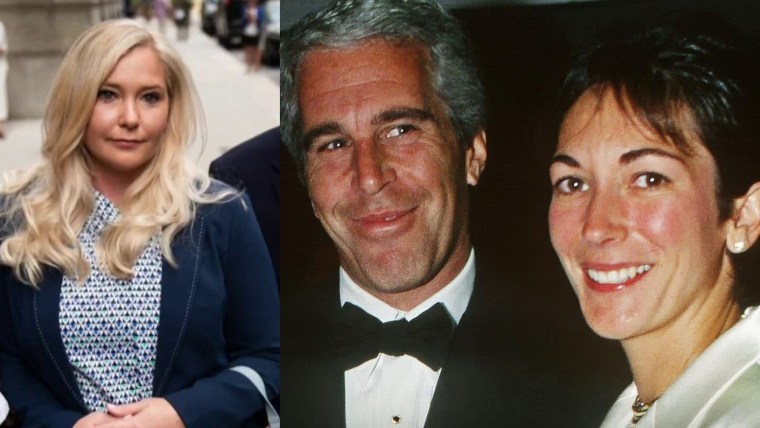
For years after Epstein’s 2008 conviction on a solicitation charge in Floridaquestions were asked about the friendship. Sketchy affiliations were part of the criticism of Andrew’s tenure as U.K. trade ambassador. But it wasn’t until after Epstein died in 2019 — while awaiting trial on federal charges of sex trafficking and conspiracy — that Andrew spoke out. His BBC “Newsnight” interview that November was a debacle of such proportions that it has been dramatized by both Netflix and Amazon. Andrew claimed not to sweat, categorically denied Giuffre’s allegations and expressed no regret over his friendship with Epstein. His tone-deaf statements and failure to apologize were swiftly condemned.
Ever since, Andrew has been trying to draw a line under this scandal. Days after the “Newsnight” interview, he announced he would step back from public life. In early 2022, he returned his military honors and said he would not use his Royal Highness title. Soon after that, he settled a civil lawsuit with Giuffrewith no admission of guilt, for an undisclosed sum. This month, he announced he would not use his Duke of York title. Global humiliations all, and made under intense pressure, but technically the prince had lost none of his privileges.
Things took a turn this month when U.K. news outlets published more emails purportedly between Andrew and Epstein, including messages reportedly showing Andrew had asked his taxpayer-funded police guard to dig up dirt on Giuffre. This prompted a response from London’s Metropolitan Police — it is looking into the reports — but no comment from Andrew or the palace. Details emerged of Andrew’s lease for the 30-room crown-owned mansion he’s rented since 2003.
Turns out nothing sparks outrage like rent of one peppercorn per year.
No one knows what other details about Andrew’s activities could still emerge.
Although Parliament and the monarchy traditionally stay out of each other’s affairs, and control over Andrew’s titles rests with the sovereign, public anger prompted some members of Parliament to question why Andrew should live effectively rent-free in a grand home. For the palace, such discussion is a slippery slope. The monarchy doesn’t want clarity brought to opaque royal financial arrangements, and it’s unlikely people are going to stop asking how, exactly, Andrew affords his lavish lifestyle. No one knows what other details about Andrew’s activities could still emerge.
After the king announced he would strip Andrew of his royal titles, Giuffre’s brother publicly thanked Charles and reflected on his sister’s bravery in speaking out. “This normal girl from a normal family has taken down a prince,” he tearfully told the BBC. That she did not live to see the response to her harrowing story compounds the sadness.
But this is not the end of Andrew’s story. He has been banished — to the Norfolk countryside. Reportedly sometime after Christmashe will move to a property on the Sandringham estate, which is privately owned by the king. His daughters, Princess Beatrice and Princess Eugenie, will retain their titles, while the king will fund his brother.
Now the question is whether there will be a police investigation, potentially clearing Andrew Mountbatten Windsor’s name — or resulting in charges he would have to face without royal protection.
Giuffre’s brother has said Andrew should be behind bars. Others have suggested Andrew could tell authorities what he witnessed at Epstein properties — details that might corroborate accounts from victims. With U.S. lawmakers still focused on Epstein, this issue isn’t closed.
The palace statement says royal sympathies are with the victims of abuse, but if that were the case, the royal family could have acted more firmly years ago. Distancing themselves from Andrew is not the same as calling for accountability.
Autumn Brewington
Autumn Brewington is an opinion editor at BLN Daily. She was previously an opinion editor at The Washington Post, where she oversaw the op-ed page for seven years, and has also edited at The Wall Street Journal and Lawfare. She launched The Post’s royal newsletter and writes about the British royal family on Substack.
The Dictatorship
Our national debt and spending are up despite DOGE and other federal cuts. Here’s why.
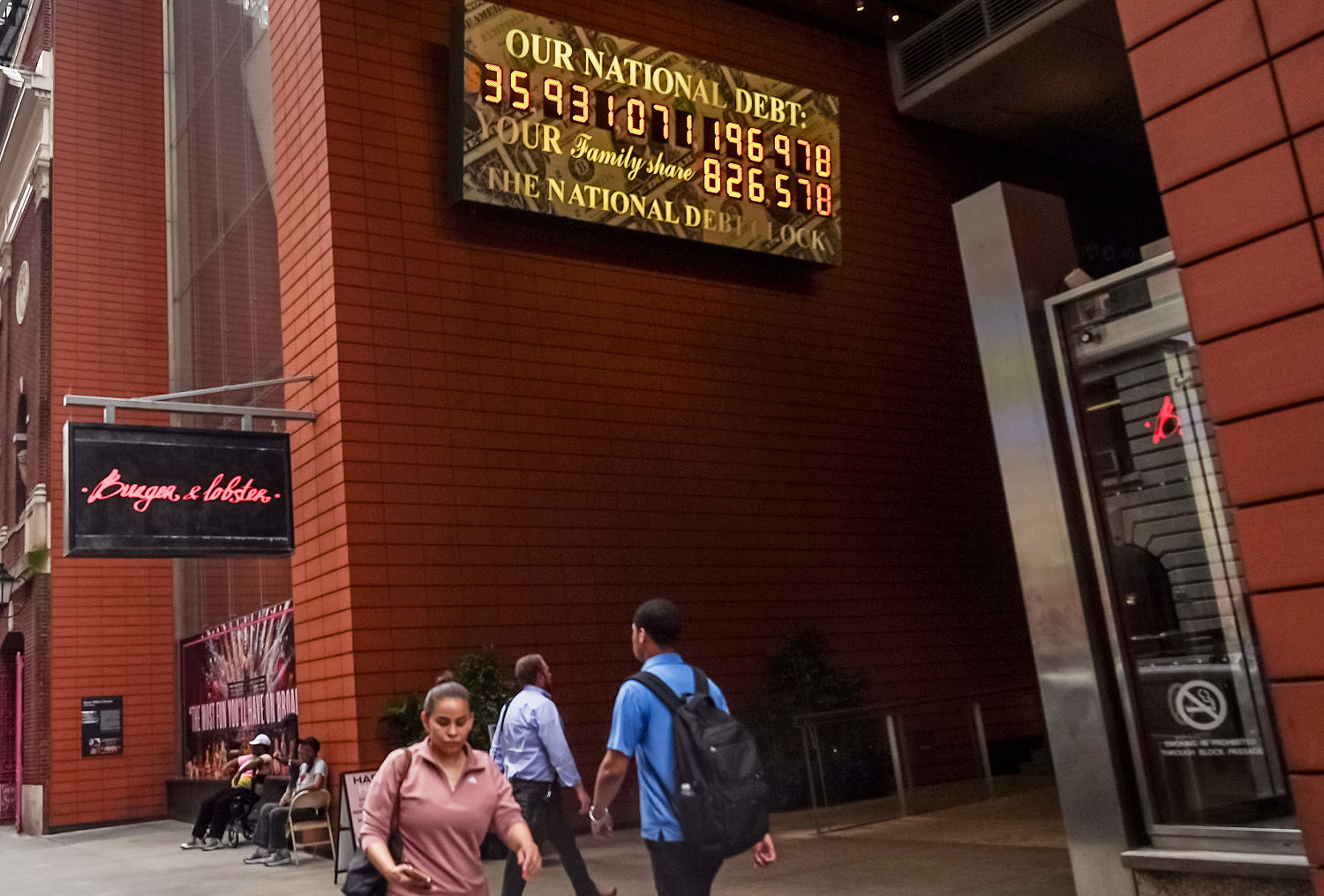
There are two fundamental fiscal truths: America has a debt problem, and dealing with the debt will not be easy.
So far, our leaders are not coming to terms with the facts.
The numbers speak for themselves. In the fiscal year that just ended on Sept. 30 — the last date for which the federal government was funded — the deficit was largely unchanged from its fiscal 2024 level: $1.8 trillion. In other words, despite the Trump administration’s focus on cost cutting in the federal government and all the additional revenue coming from tariffsthe deficit is still as large as it was a year ago.
All told, federal spending from January 2025 to September 2025 is up about 2% from the same period in 2024.
All told, federal spending from January 2025 to September 2025 is up about 2% from the same period in 2024. You might wonder how that is possible, given that the government (when it was funded) has operated under the same discretionary spending levels as last year, as well as high-profile Trump administration activities such as the Department of Government Efficiency effort, downsizing of the federal workforce, the abolition of the U.S. Agency for International Development and the forthcoming closure of the Department of Education. Two words: mandatory spending.
The largest mandatory spending programs are Social Security and Medicare. Others include things such as Medicaid and the Affordable Care Act subsidies, safety-net programs such as SNAP and Supplemental Security Income, and various other programs such as student loans and some veterans’ benefits. These programs don’t require regular review by Congress, and they grow automatically for a variety of reasons, such as higher enrollment or higher costs.
A closer look at the numbers is revealing. Since January, the federal government has spent $5.2 trillion — about $100 billion more than it spent from January through September of 2024. Spending on Social Security — the largest federal program — grew by $96 billion; Medicare spending grew by $58 billion; and spending on other federal health programs, including Medicaid, grew by a combined $46 billion. Discretionary spending, which Congress decides on annually through the appropriations process, grew as well, largely due to increases in defense ($19 billion) and the discretionary portion of veterans’ benefits ($27 billion). And do not forget about interest on the national debt, which grew by $63 billion.
Offsetting about two-thirds of the total increase in spending was a combination of one-time savings for student loan programs enacted by the One Big Beautiful Bill reconciliation law and decreases in spending on international affairs ($22 billion), among other relatively small changes.
For all the recent talk of policymakers’ interest in curtailing spending, the glaring issue when it comes to actual action has been the two behemoths of the budget: Social Security and Medicare.
To get borrowing under control, we’ll need to cut spending, increase revenue or some combination of the two (ideally along with economic growth). The reconciliation law put in place significant spending cuts, largely achieved through smart savings such as cracking down on abusive financing practices that states use to exploit Medicaid’s formula for matching funds. But those cuts were more than drowned out by massive tax cuts — only a small portion of which were financed — as well as increases in spending for defense and border security. That mismatch will increase interest costs as well. As a result, that law will cut total spending through 2034 only by about $400 billion — compared to $86 trillion in spending during the same period.
For all the recent talk of policymakers’ interest in curtailing spending, the glaring issue when it comes to actual action has been the two behemoths of the budget: Social Security and Medicare. Without touching either of these programs, there really isn’t much space to make significant improvements in our country’s fiscal situation. Worse, both programs have trust funds that are on a path toward insolvency. Social Security’s retirement trust fund and Medicare’s Hospital Insurance trust fund will run out of reserves in just seven years. At that point, the programs will be slashed — Social Security benefits by 24% and Medicare by 12% — as they are unable to cover what has been promised. Not making spending changes cements these across-the-board cuts.
Americans should be concerned with the dismal state of our fiscal situation. It will take tough choices and trade-offs to slow the growth in spending or otherwise raise revenue to the point that our national borrowing is sustainable. Ideally, our leaders would do that before it is too late.
Maya MacGuineas
Maya MacGuineas is president of the nonpartisan Committee for a Responsible Federal Budget.
The Dictatorship
I’m the woman acquitted for assaulting an FBI agent. Here’s my story.

I’m a law-abiding citizen who never thought I’d be of such interest that the U.S. government would use my tax dollars and yours to try to send me to prisonbut there I was in Washington, D.C., at the end of July being manhandled by an Immigration and Customs Enforcement agent trying to remove my phone from my hand.
And there I was in court last month being tried — and quickly acquitted by a jury of my peers — on the false charge that I’d “forcefully pushed” an FBI agent’s hand against a cement wall and “caused lacerations.” All I’d done that night in July was stand outside the D.C. jail so the families of the men being detained for possible deportation would know what had happened to them. I wanted those men and their families to be treated fairly in this unjust time we are living in.
Observing and recording what my government does is my business.
But as he threw me against a wall and handcuffed me, the agent who arrested me said, “If you just minded your own f—ing business, this wouldn’t happen.”
If I had minded my own business. Observing and recording what my government does — which is what I was doing when I got arrested — is my business.
Here’s what sticks out about my experience: being put in the back of an unmarked SUV and with handcuffs that were put on so tight, I have permanently lost feeling in my thumb; not being read my rights or being told what I was being charged with beyond not minding my business.
Shortly before my arrest, I had just gotten a new job working at an animal hospital and moved into a new apartment in a part of the city I’ve always wanted to live in. Things were going great. But would I even have a job to go back to now?
I’m glad I did. My supervisor actually thanked me for doing what I did, for standing up for a group of people being targeted in this country. And I cried. I believe that filming what federal agents were doing that day counted as basic human decency.
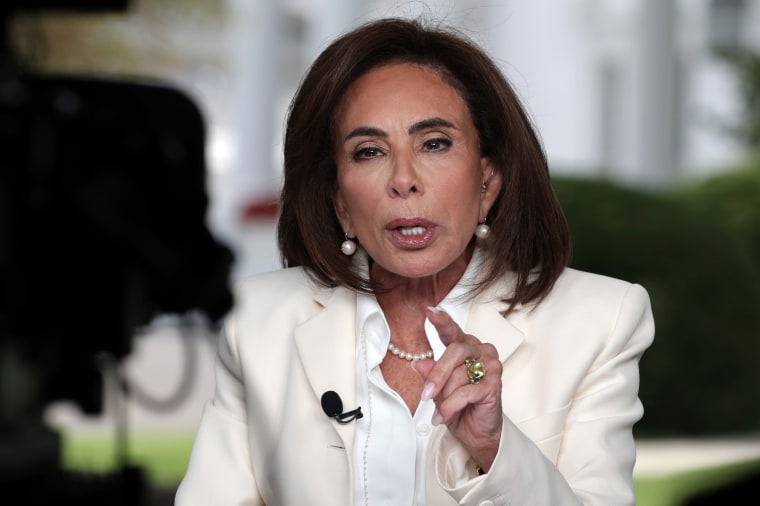
After days of not knowing why I was being held, my public defender, Tezira Abe, told me the government wanted to charge me with felony assault of a federal agent, a crime that carried up to eight years in prison. I was dumbfounded.
Three grand juries refused to indict me after the government presented its case against me. That should have been the end of it. But then U.S. Attorney Jeanine Pirro’s office decided to charge me with a misdemeanorwhich doesn’t require a grand jury. I don’t know which was greater, my fear or my disbelief. I was still facing a year in the county jail.
But I’m grateful that on Oct. 16, jurors saw through what our government was trying to do to me and quickly acquitted me.
As I said in a statement that day, “Knowing that I can stand in front of 12 of my fellow citizens and be found not guilty for standing up for basic human rights makes me feel like, despite the scary times we live in, we have hope for the future.”
My attorneys, Tezira Abe and Eugene Ohm, added, “We are pleased with the verdict but this is a trial that should never have happened. Twelve D.C. residents, numerous taxpayer-paid court staff and public defenders had to spend time and resources on trying a case that has no place in a free democracy.” They also said: “The Department of Justice can continue to take these cases to trial to suppress dissent and to try and intimidate the people. But in the end, as long as we have a jury system, our citizens will continue to rebuke the DOJ through speedy acquittals.”
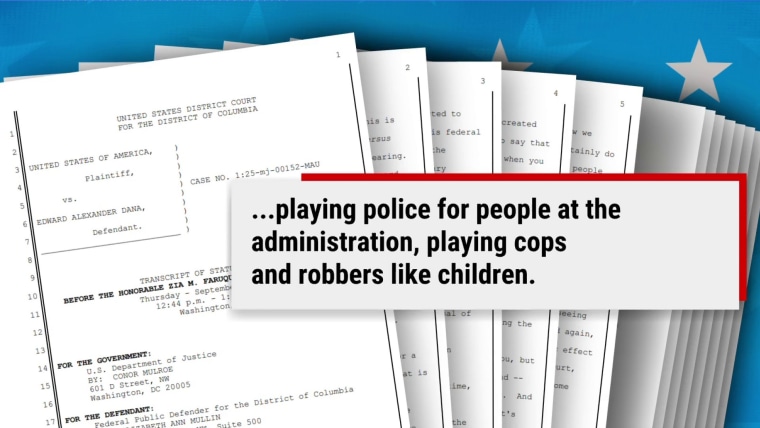
Though I was ultimately acquitted, I should never have been arrested and should never have been charged. The government’s unfair prosecution of me caused my life to be at a standstill for three months. I stopped unpacking my apartment and closed myself off from everything. Why would I keep on unpacking my apartment if I would have to empty it back out? How could I overcome the sadness I felt toward my country and enjoy my life? I kept my head down and worked. That was the only escape I had.
I was taught that you don’t have to make a scene or shout to be heard and that sometimes the quiet actions speak for themselves. This is not one of those times. We should all be screaming. We should all be taking action. This is our country. We are greater and stronger than this administration.
Sidney Reid
Sidney Reid is a Washington, D.C., resident who was booked with federal charges in July and acquitted in October.
The Dictatorship
The truth about who suffers from the White House’s manufactured SNAP crisis
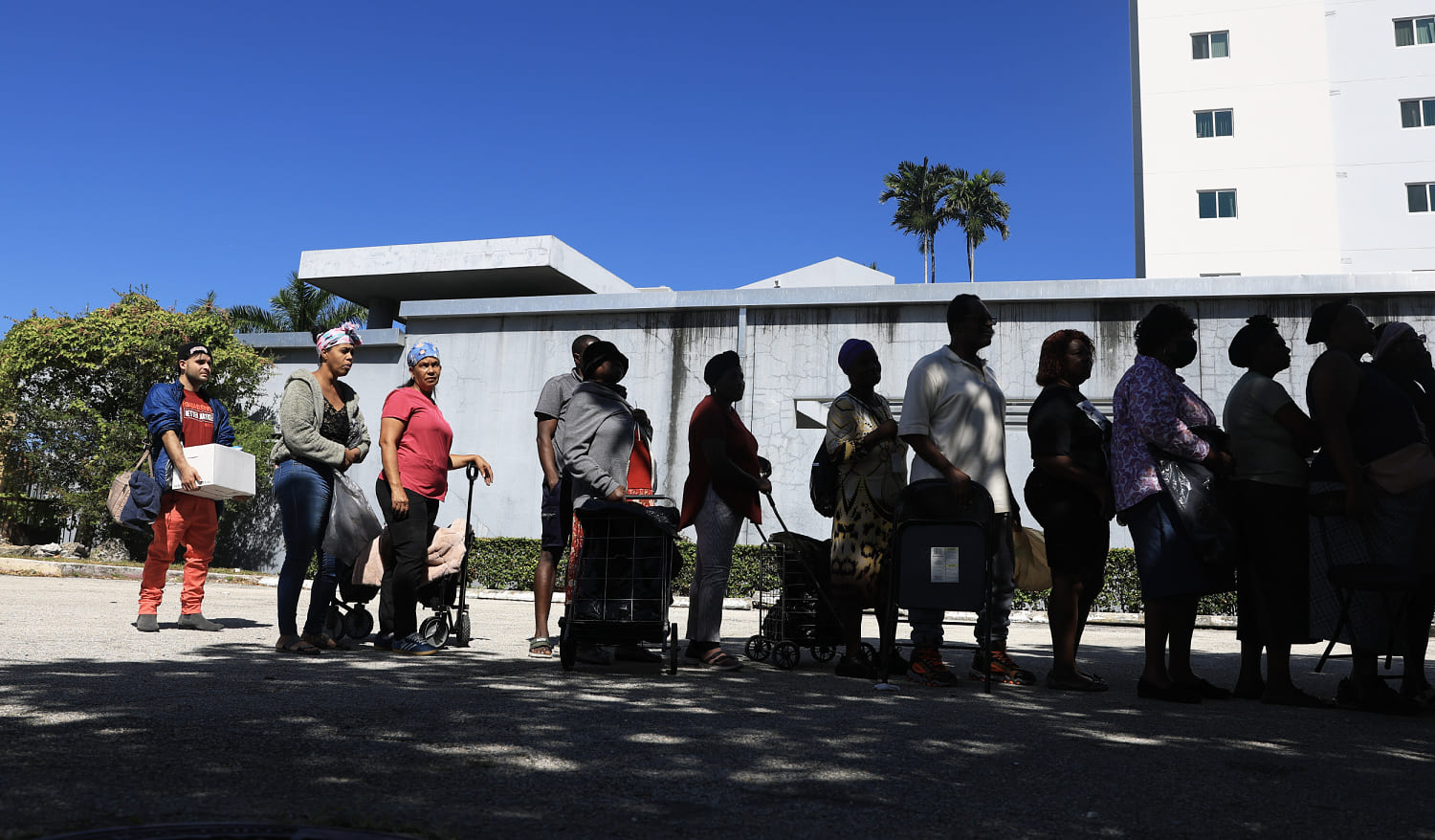
More than 40 million Americans — that’s 1 in 8 people in this country — count on help from the federal Supplemental Nutrition Assistance Program to afford groceries each month. Many of them will wake up this morning to find their November benefits have not arrived. That’s because, for weeks, the Trump Administration has been saying it won’t provide those benefits, claiming that the government shutdown prevents funding them.
On Friday, in separate rulings, two federal judges ordered the Trump administration to use emergency funding to pay SNAP benefits. They confirmed the administration is legally required to tap contingency funds that Congress provided for precisely this scenario. They also confirmed that the administration can transfer additional funding to SNAP — as they did recently to shore up the WIC program — to supplement those contingency funds, which alone aren’t enough to fund full benefits.
About 16 million children get food assistance through SNAP each month.
Friday evening, the president wrote on TruthSocial“I have instructed our lawyers to ask the Court to clarify how we can legally fund SNAP as soon as possible.” But there’s no need for more deliberation or clarification. The administration is sitting on billions in contingency funds and needs to release them. The administration could have, and should have, taken steps weeks ago to be ready to use these funds. To further delay will rip away vital food assistance from millions of low-income families right before the holidays.
About 16 million children get food assistance through SNAP each month. So do eight million older adults and four million people with disabilities. SNAP also helps millions of low-income workers and their families. In fact, most SNAP participants who can work do work, with many in industries such as service or sales, where the pay is often low and the work hours inconsistent.
SNAP households have very low incomes. To qualify, a household’s gross monthly income generally must be at or below 130 percent of the poverty line, or roughly $2,850 a month (about $34,600 a year) for a three-person household. More than half of SNAP benefits go to households that are deeply poor, with incomes below 50 percent of the poverty line.

People of all racial and ethnic backgrounds participate in SNAP. Roughly 42% of the heads of SNAP households are white, 25 percent are Black, 23 percent are Latino, and 4 percent are Asian. SNAP participants come from all kinds of communities, rural, suburban, and urban.
SNAP benefits are modest: just $6.20 per person per day. But even that limited aid protects families from hunger and hardship by helping them afford enough food and freeing up room in their budgets for other basic needs such as rent, utilities and medical care. Participating in SNAP reduces the share of households who are food insecure (meaning they don’t have access to adequate food) by up to 30%. It’s even more effective for children and for families with “very low food insecurity,” where one or more household members have to eat less due to lack of money.
Not only are contingency funds available, but the administration is legally required to use them.
In short, SNAP helps millions of families lift themselves out of poverty. Its positive effects aren’t limited to its recipients either. The program also stabilizes the economy during downturns and supports businesses where SNAP dollars are spent, as well as their suppliers. But all those benefits hinge on continued federal funding.
The administration’s decision to starve SNAP during the shutdown is consistent with the president’s — and congressional Republicans’ — treatment of the program in their “One Big Beautiful Bill” enacted in July. It imposed the biggest cuts in SNAP’s 50-year historyincluding expanding punitive policies that take SNAP away from people who don’t meet rigid, paperwork-laden work requirements to apply to parents of many school-age children, adults as old as 64 and veterans.

My Center on Budget and Policy Priorities colleagues and I estimate that roughly four million people, including one million children, will see the food assistance they need to afford groceries terminated or reduced substantially under the new law. The law’s SNAP cuts, plus its massive cuts in health care coverageare designed to partly offset the cost of enormous tax cuts favoring wealthy households. Those making more than $1 million a year, for example, will get an average tax break of $100,000 apiece, while millions more struggle to put food on the table.
The administration created this crisis and can just as easily solve it. First, USDA should release SNAP contingency funds as the law allows. USDA should also augment those funds by using its discretion to transfer other funding to SNAP, as it did for WIC. The millions of people who count on SNAP deserve no less. And the American people deserve a government that will never inflict unnecessary hardship on vulnerable people.
Ty Jones Cox
Ty Jones Cox is the vice president for food assistance at the Center on Budget and Policy Priorities.
-
Uncategorized12 months ago
Bob Good to step down as Freedom Caucus chair this week
-

 Politics8 months ago
Politics8 months agoFormer ‘Squad’ members launching ‘Bowman and Bush’ YouTube show
-

 The Josh Fourrier Show12 months ago
The Josh Fourrier Show12 months agoDOOMSDAY: Trump won, now what?
-

 The Dictatorship9 months ago
The Dictatorship9 months agoPete Hegseth’s tenure at the Pentagon goes from bad to worse
-

 Politics8 months ago
Politics8 months agoBlue Light News’s Editorial Director Ryan Hutchins speaks at Blue Light News’s 2025 Governors Summit
-

 The Dictatorship9 months ago
The Dictatorship9 months agoLuigi Mangione acknowledges public support in first official statement since arrest
-

 Politics8 months ago
Politics8 months agoFormer Kentucky AG Daniel Cameron launches Senate bid
-

 Politics12 months ago
Politics12 months agoWhat 7 political experts will be watching at Tuesday’s debate




